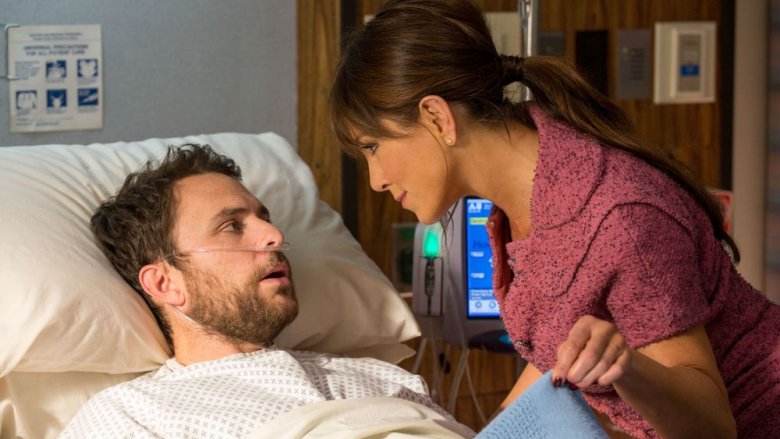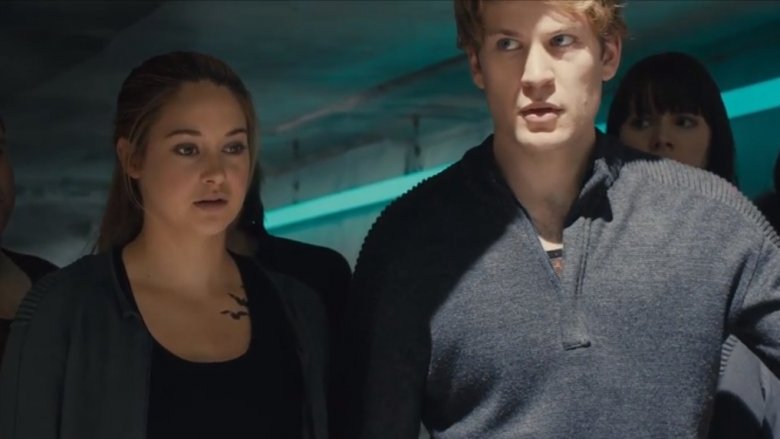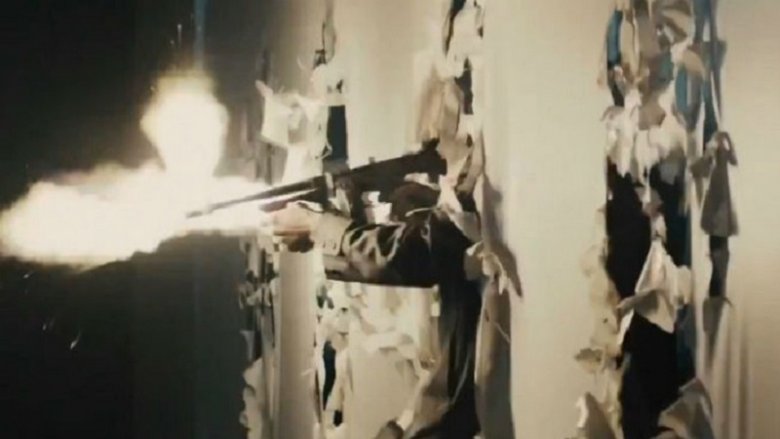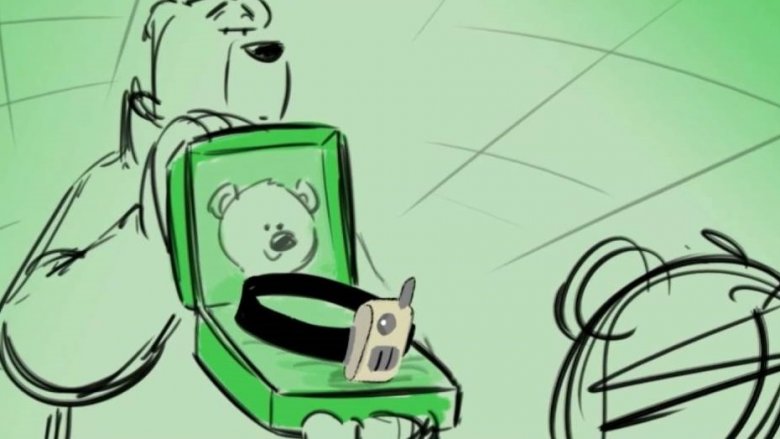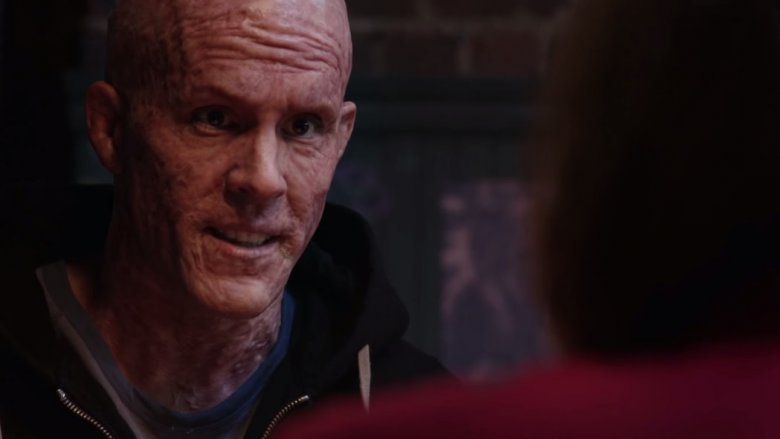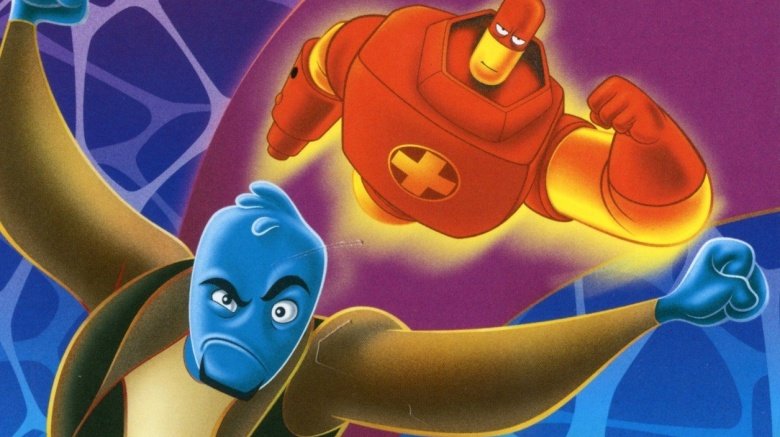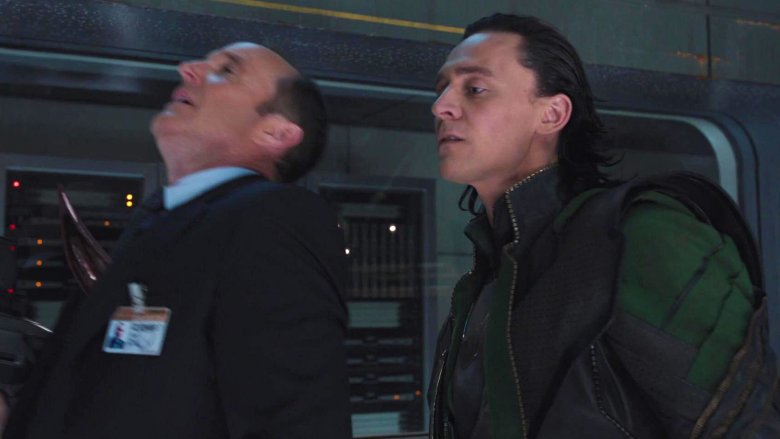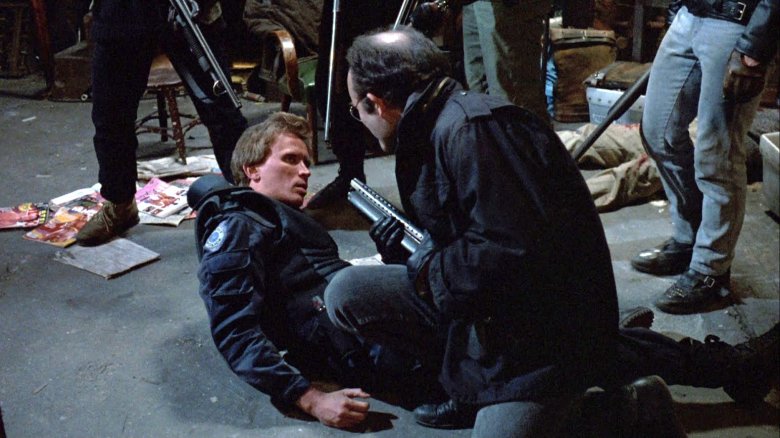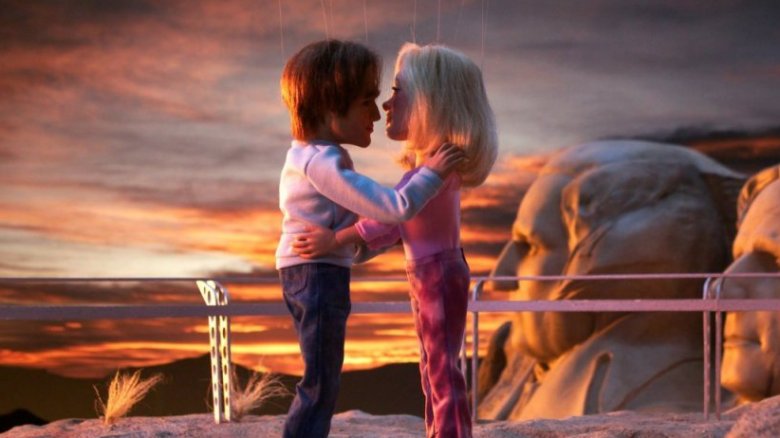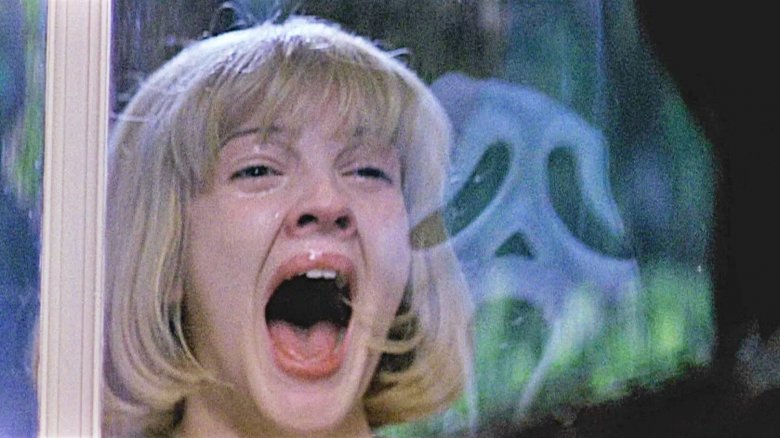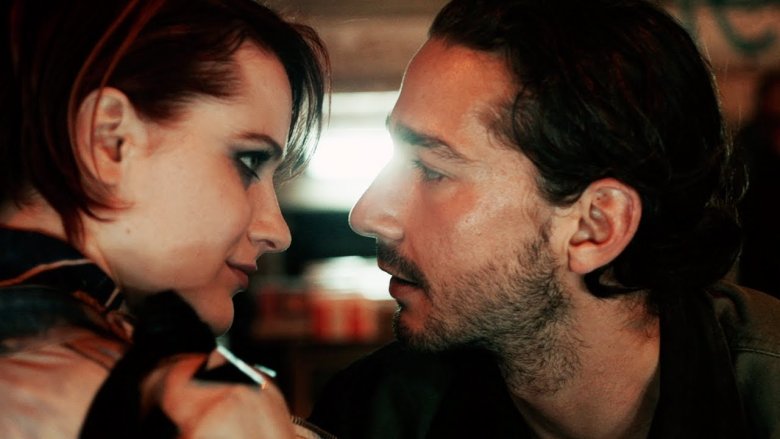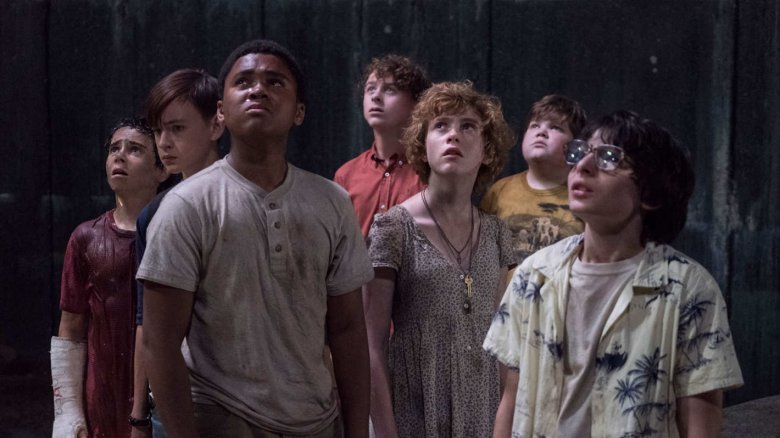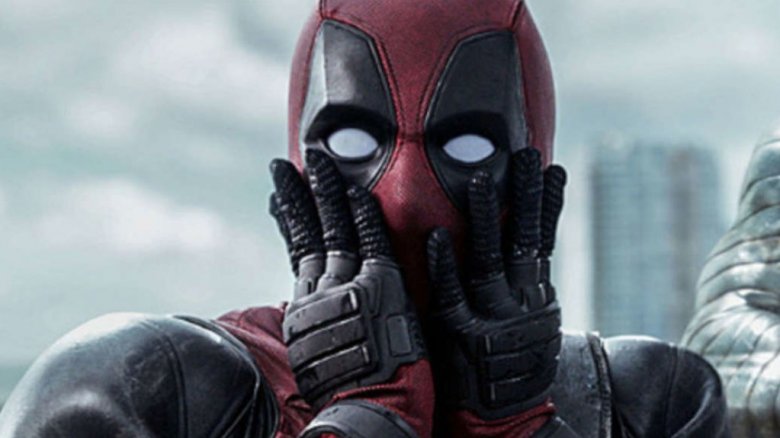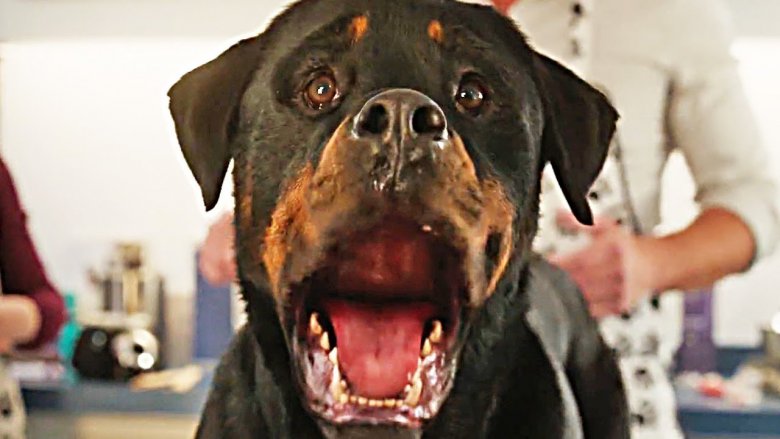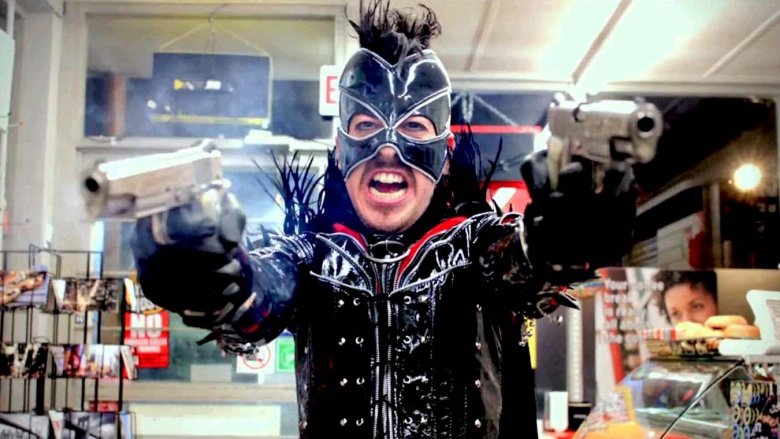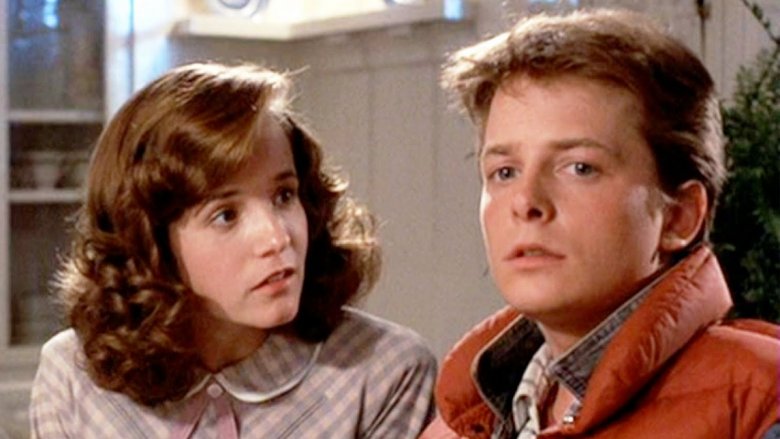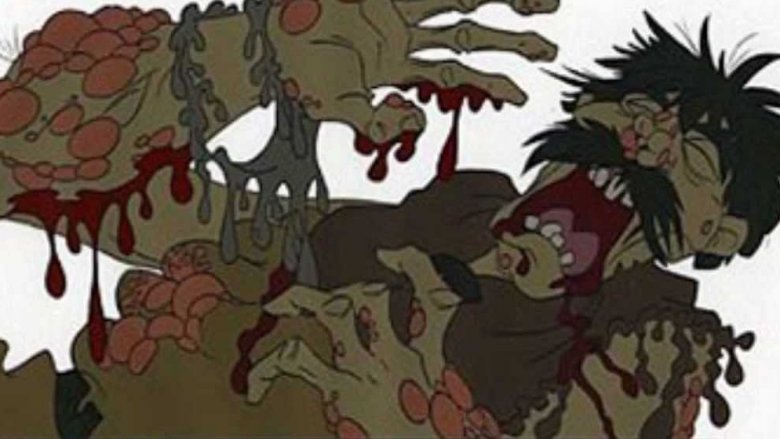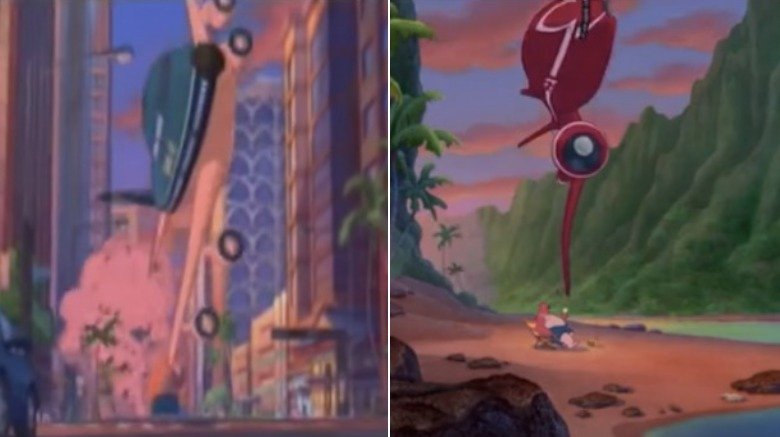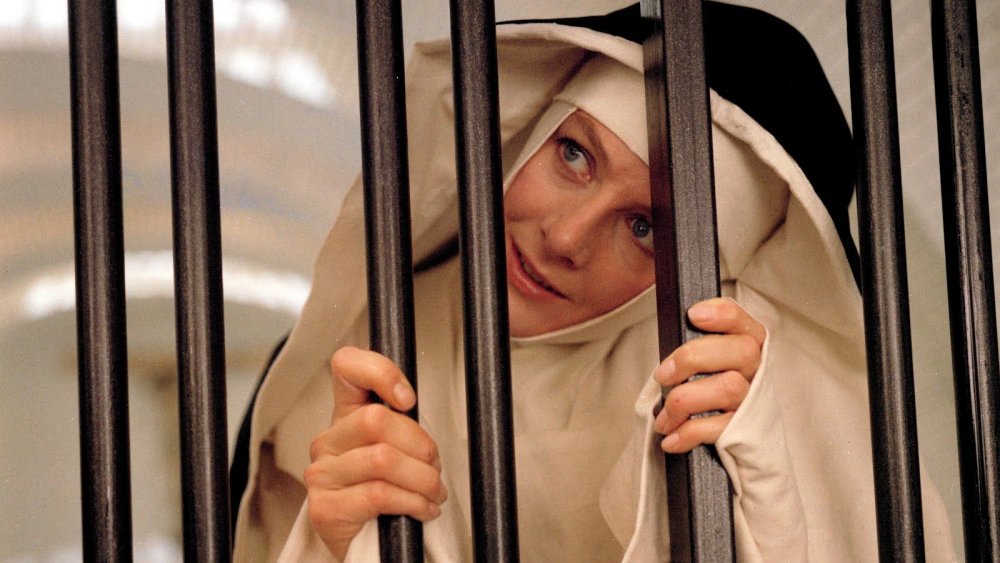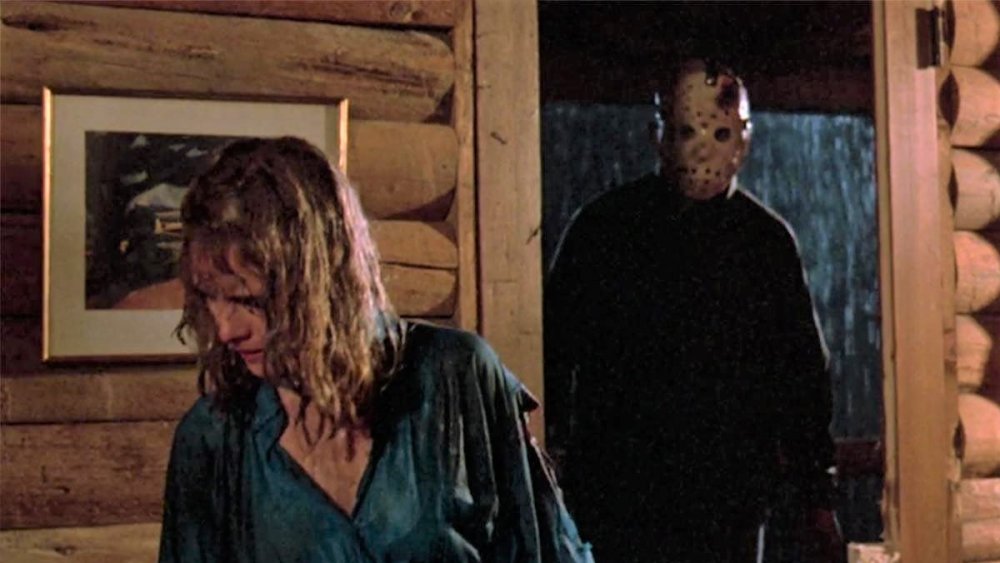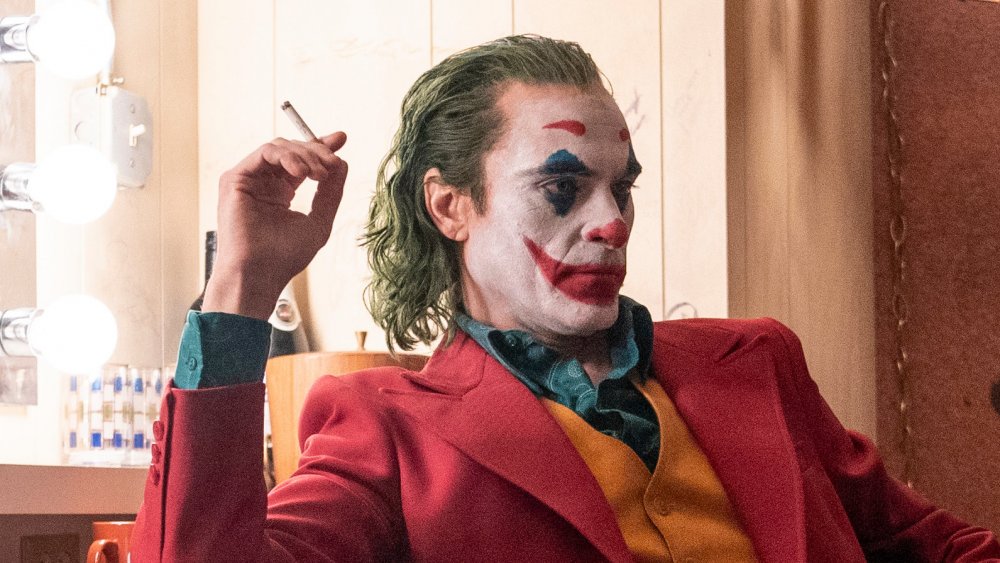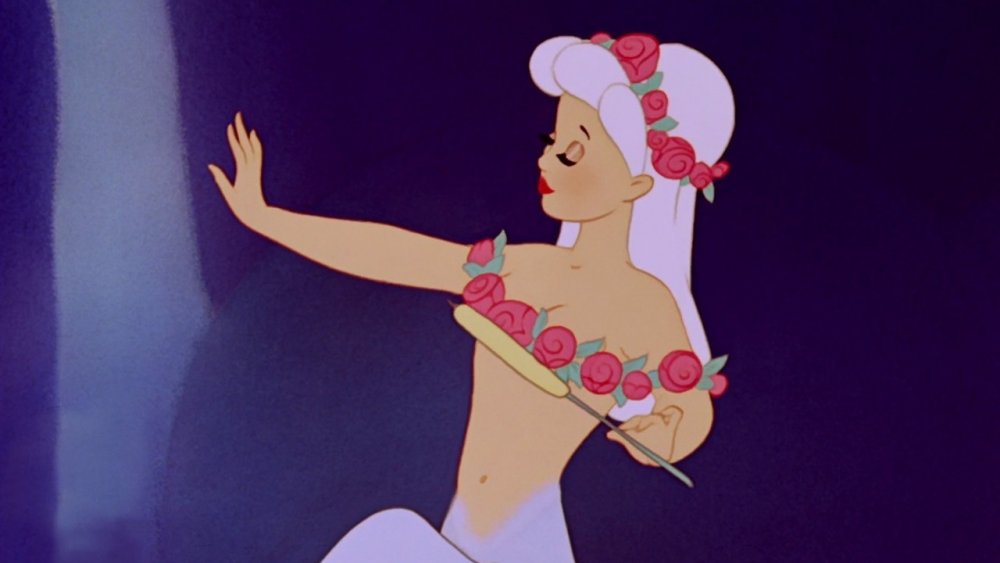Movie Scenes Cut For Being Too Offensive
Fortune often favors the bold when it comes to making movies, but just because a film's director is willing to push the boundaries of decency in the name of making compelling entertainment doesn't always mean they're guaranteed to get away with it. In fact, sometimes they end up paying the ultimate price and watching bits of their hard work snipped away and left on the cutting room floor before audiences even have a chance to see it.
Needless to say, there's a long history of filmmakers forced to make tough decisions in post-production in order to get their movie into theaters, and the films that have ended up undergoing changes aren't always the ones you might think. We've peered into Hollywood's past to round up some of the more memorable instances in which movies underwent last-minute surgery in order to avoid upsetting audiences. From instances of extreme violence to explicit sexual content, the following scenes were all considered too offensive to be allowed.
Horrible Bosses 2 rape scene
2014's Horrible Bosses 2 didn't fare as well as the original with the critics, but some deemed Jennifer Aniston's "even raunchier" performance one of the highlights. Jason Sudeikis was just one of the many cast and crew members who praised Aniston's willingness to be a "nympho potty mouth" for the sake of the film, but there was one scene that went a little too far.
"Charlie Day's character is in a coma, and I exploit him," Aniston told Conan. After host Conan O'Brien asked why the scene wound up on the cutting room floor, she demurred. "It was kind of, not even mutual, you know?" she said. "I'm not gonna say it."
Even with this scene cut, some still found Aniston's character offensive. As the critic for The Mercury put it, "When her initial attempts to simply coerce people into sleeping with her eventually evolve into a textbook definition of rape, well, I just didn't feel like laughing any more."
Divergent eyeball stabbing
The YA genre isn't exactly known for brutal violence, but the first book in Veronica Roth's Divergent trilogy contains a scene in which a character named Edward is stabbed in the eye with a butter knife while sleeping. Tris (portrayed by Shailene Woodley in the film adaptations) stems Edward's bleeding.
A version of this disturbing turn of events was filmed for the first Divergent movie, but wound up getting axed. Director Neil Burger came to Lionsgate's defense over the decision to remove the scene, claiming it had more to do with overall cinematic flow than achieving a PG-13 rating. But he then went on to admit that there was "a lot of trimming" done to tone down the more violent elements.
If they had chosen to stick to the source material and include the grittier moments from Roth's novels, then maybe the franchise wouldn't have collapsed. After third film Allegiant bombed, fourth installment Ascendant was re-imagined for TV, which caused Woodley to drop out.
Gangster Squad cinema shooting
Ruben Fleischer's 2013 crime thriller Gangster Squad is about the real life LAPD unit formed to combat notorious mob boss Mickey Cohen and his gang during the 1940s and '50s. Just weeks after the first trailer (which included clips from a scene where moviegoers are gunned down with machine guns in a Chinese movie theater) started airing, mass murderer James Holmes opened fire at a Colorado cinema during a midnight screening of The Dark Knight Rises, killing 12 people and injuring 70.
"The Aurora shooting was an unspeakable tragedy, and out of respect for the families of the victims, we felt it necessary to reshoot that sequence, and I'm proud of the fact that we did," Fleischer said at a Gangster Squad press day (via IndieWire). "I think that we didn't compromise the film or our intent, and I think the [new] Chinatown sequence is really well done, and that we should all respect the tragedy and not draw associations to our film."
Zootopia's 'taming parties'
2016's Zootopia set a new March record for animated movies when it opened to a $75 million haul, Walt Disney Animation's "biggest opening grosser ever," according to Deadline's calculations. The film wound up scoring an incredible 98 percent on Rotten Tomatoes, whose critics lauded it for its sumptuous animation and "thoughtful, inclusive message," though Zootopia's message was delivered in a far blunter fashion when it was first conceived.
The film we saw in cinemas was a deft commentary on racial profiling, with Zootopia's minority predator population discriminated against by the fearful prey, despite their efforts to live harmoniously. The original script (in which cynical fox Nick was the protagonist, not idealistic bunny cop Judy) contained something called "taming parties" in which predatory animals were fitted with collars that shocked them whenever they had a carnivorous thought.
"It stuck around a very, very long time because we found it emotionally compelling," co-director Byron Howard revealed during his blu-ray commentary (via AWN). Compelling it may have been, but upon reflection, Disney decided the shock collars struck the wrong chord. "They're the Zootopia equivalent of having Jewish people wear the Star of David," SlashFilm said of the deleted scene.
Deadpool's vulgar bar scene
2016's Deadpool definitively proved once and for all that there's a market for R-rated superhero films. Described as "gleefully profane" by Rotten Tomatoes (where the film has a Certified Fresh rating of 84 percent), the Ryan Reynolds-led flick made over $780 million at the worldwide box office, with audiences going nuts for its no-holds-barred take on the genre. There were some lines that they wouldn't cross, however, as Tim Miller revealed at an early screening.
"In particular, there was a bar scene that was too vulgar for even the R-rated Deadpool," the director admitted. "T.J. [Miller] and Ryan [Reynolds] got together and wrote a version of the scene that we just said, 'Oh my God, this is too far.' I mean there were so many people offended... It was just mean and so I said, 'No. We don't have to do that.'"
T.J. Miller, who plays Deadpool's best friend Weasel, was also present at the event, and said (via Collider) that the scene "just got more and more hateful" the longer it went.
Osmosis Jones sperm gym
Half live-action and half animation, Osmosis Jones follows enthusiastic white blood cell Osmosis (Chris Rock) and cold medication pill Drix (David Hyde Pierce) as they attempt to save their human host (Bill Murray) from a deadly virus. The movie tanked with critics and audiences, and whether the footage that was removed from the final cut would have made much of a difference is hard to say, but it certainly would have made a lot more sense had it been released intact: earlier drafts explained the absence of Ozzy's family and how William Shatner's Mayor Phlegmming ended up out of office.
One particular scene, set in Frank's testicles, was given the axe because it was deemed too offensive for younger members of the audience. Ozzy and Drax were supposed to visit Gonad's Gym to question the sperm cells working out there, but in the final cut, the only reference to the place is a sticker that briefly appears on Drax's suitcase.
Coulson's death in The Avengers
To give 2012's The Avengers the best chance of succeeding, Marvel needed a PG-13 rating—which, believe it or not, they were initially denied because the MPAA were unhappy about the scene in which Agent Phil Coulson (Clark Gregg) is stabbed in the back by Loki (Tom Hiddleston).
"When we submitted The Avengers, the first couple cuts of it came back from the MPAA rated R," Marvel Studios head Kevin Feige told Movies. "That happened twice, so we went back and had to make adjustments. Whenever you impale somebody from their back and the blade comes out their chest, there are issues."
In the original version of Coulson's (what turned out to be temporary) death, the edge of Loki's scepter bursts through the unsuspecting agent's torso. In the version released to theaters, the protruding blade has been edited out altogether and clever cuts lessen the horror of Coulson's cold-blooded murder, making it less visceral and more palatable for younger viewers.
Murphy's death in Robocop
Paul Verhoeven made two cuts to his sci-fi classic RoboCop to bring it down to an R. The offending scenes involved leading man Peter Weller and Kevin Page, who played the young executive that gets shot to ribbons during a botched demonstration of the ED-209 police robot. "He finally got the R in the last round of submitting to the ratings board by cutting four seconds: two seconds of me being shot on the table and two seconds of the back of Peter Weller's head coming off," Page told The Hollywood Reporter.
Weller (who starred as Alex Murphy, the policeman who becomes Robocop) had the more memorable of the scenes in question—his hand and arm are blown off by shotgun blasts before he takes a bullet to the forehead. An elaborate model of Weller was created for the sequence, which originally showed the exit wound in extreme detail, though this shot lasted less than a second in the theatrical cut.
Team America puppet sex
Matt Stone and Trey Parker know all about straddling the line between the R and NC-17 rating: 2004's Team America: World Police had to be re-cut a total of nine times before the MPAA granted it an R rating. When the duo behind South Park first conceived their politically charged all-puppet satire, the last thing they probably expected to get pulled up on was the sex scene. "It's something we all did as kids with Barbie and Ken dolls," the L.A. Times quoted Parker as saying at the time, but the board didn't see it that way, finding much of the marionette sex too offensive.
"There's nothing we're asking for that hasn't appeared in other R-rated movies, and our characters are made of wood and have no genitalia," producer Scott Rudin said of his prolonged battle to avoid the NC-17 rating. "If the puppets did to each other what we show them doing, all they'd get is splinters."
Spilling guts in Scream
Wes Craven's Scream had to fight with the MPAA to get an R rating, and while he refused to alter the opening scene in which Casey (Drew Barrymore) is stalked by the killer, he agreed to remove the shot of her boyfriend's steaming intestines spilling out.
There was one scene toward the end that also had to be tweaked, involving two characters (Stu and Billy) stabbing each other repeatedly. "Almost the entire third act had to be drastically altered," Craven told Bloody Disgusting. "You know, the whole scene in the kitchen with the boys stabbing each other to establish the alibi, all of that."
When Craven made Scream 4 in 2011, he was surprised to find the censors in a far more lenient mood. "On this film, to my astonishment frankly, there were no cuts demanded," the horror veteran added. "I guess if nothing else, it's a great example of how as a filmmaker you just have no idea what the MPAA is going to do."
Charlie Countryman's sex scene
Charlie Countryman Leading lady Evan Rachel Wood had nothing but good things to say about her co-star Shia LaBeouf after filming the 2013 feature, but had some stern words for the Motion Picture Association of America after viewing the final cut. "I would like to share my disappointment with the MPAA, who thought it was necessary to censor a woman's sexuality once again," she said during a series of angry tweets, compiled by Variety.
"The scene where the two main characters make 'love' was altered because someone felt that seeing a man give a woman oral sex made people 'uncomfortable' but the scenes in which people are murdered by having their heads blown off remained intact and unaltered," she added. "This is a symptom of a society that wants to shame women and put them down for enjoying sex, especially when (gasp) the man isn't getting off as well!"
It's infamous sewer orgy
Anyone who's seen Andy Muschietti's adaptation of Stephen King's classic It knows that it's plenty disturbing, but if True Detective creator Cary Fukunaga had stayed on, things would have been even creepier. According to The Telegraph, Fukunaga, who was at the helm of the project between 2012 and 2015, put together a screenplay that "horrified" the parents of prospective child actors with its "gross" sex acts.
The Telegraph quoted parents who were shown his script, with one calling out the producers for attempting "to hire underage actresses to make out with creepy old men," and another expressing shock at how far a scene featuring forced incest went.
To be fair to Fukunaga, King's novel was more shocking still: the Loser Club's only female member has sex with all six of the boys in order to save them. "The sexual act connected childhood and adulthood," King explained. "Times have changed since I wrote that scene and there is now more sensitivity to those issues."
Killing baby Hitler in Deadpool 2
Deadpool pushed the boundaries of the superhero movie further than they'd ever been pushed before, and Deadpool 2 upped the ante when it came to gleeful violence — but just like the first movie, there were some moments that went a little too far and had to be cut. Speaking to CBR, screenwriter Rhett Reese revealed that one of the film's post-credit scenes was originally going to involve Deadpool traveling back in time and carrying out an execution that countless people have fantasized about over the years.
"Originally it ended with Deadpool killing baby Hitler," Reese revealed. "At the very, very end of the credits, we had him going and killing an infant version of Hitler. [We] decided that was a little too harsh — not killing Hitler, but killing a baby." The scene was shot and included in a test cut, but audiences didn't react as favorably as the filmmakers originally envisioned. "He's got the crib and he's standing in the German nursery and he's leaning over the crib to do it and there was kind of this, 'ohhhhh,'" Reese told Uproxx. "And we thought we don't want to leave the crowd on an 'ohhhhh.' So it ended up coming out."
Child grooming tactics in Show Dogs
When a movie aimed at kids seems to promote tactics used by child groomers, that's a problem. 2018's Show Dogs is a supposedly family-friendly buddy comedy starring Arrested Development's Will Arnett as Frank, a cop who gets partnered with a rottweiler named Max (Chris "Ludacris" Bridges) and tasked with infiltrating a prestigious dog show. To avoid blowing their cover, a reluctant Max has to have his testicles inspected by judges. The problem wasn't the inspection itself (which is a common practice at such events) but the way in which the mortified mutt is told to deal with the situation.
"He was telling him he needs to go to his 'zen place' and I like right away was, 'Wait... what?'" These are the words of Arizona mom Terina Maldonado, who penned a letter about the movie that wound up going viral (via USA Today). "When it turns into this big pivotal scene in the end and he needs to be allowed to be touched to win the competition, [...] red flags were going up and around in my mommy head." Global Road Entertainment responded to the growing controversy by removing the offending scenes before issuing an apology to parents.
Kick-Ass 2's brutal assault
Anyone who's read Mark Millar's Kick-Ass comics knows just how dark they can get, and there's a moment in the sequel series that sums up their hard-hitting brutality perfectly. When young evildoer The Motherf***** (played by Christopher Mintz-Plasse) decides to go after the titular hero's love interest as comic book villains so often do, he does what your typical Marvel or DC bad guy would never do — he has his henchmen sexually assault her. It's hard to read, and would have been even harder to watch, which was why the filmmakers decided to drastically alter the scene for the Kick-Ass 2 movie.
"I understand what Mark was going for in that scene," writer/director Jeff Wadlow told ScreenRant. "I felt as a filmmaker — because I'm dealing with real people, not drawings of people — the audience didn't need to be taken that far to experience the same kind of feeling." Mintz-Plasse agreed, explaining that it would have been out of place in such a vibrant film. "I just didn't think it would fit for this movie, 'cause you're watching it and it's so colorful and fun and violent and you're laughing," he said. "I don't think a rape scene fits that vibe."
Gay panic in Back to the Future
There are numerous examples of politically incorrect moments in classic Hollywood movies that most certainly wouldn't make it past censors today, like Mickey Rooney's portrayal of a Japanese man in Breakfast at Tiffany's or Disney's now-infamous reconstruction era movie Song of the South. Not many of them are as recent as 1985's Back to the Future, but at least director Robert Zemeckis had the good sense to cut a blatantly homophobic scene before the movie hit theaters.
The film's plot revolves around a teenager (Michael J. Fox's Marty McFly) traveling back in time and inadvertently becoming his own mother's love interest, so it was always going to be tightrope walk for Zemeckis. In the end he got the balance right, but the deleted scene would have been a huge problem had it remained. In it, Marty tells Emmett "Doc" Brown (Christopher Lloyd) that he's feeling a little weird about the situation he's found himself in. The Doc responds by telling him to "take a few liberties with her" (which is creepy enough as is), but it's Marty's reply that really shocks. "What if I go back to the future and I end up being... gay?"
Graphic deaths in Disney's The Black Cauldron'
1985's The Black Cauldron almost sunk Disney completely. With a production budget of $25 million (which had reportedly ballooned to $40 million by the time it was finished), this loose adaptation of Lloyd Alexander's award winning fantasy series The Chronicles of Prydain was the most expensive animation ever made at the time. With Walt himself no longer around, new CEO Michael Eisner was eager to take the company in a new direction and tap into the Dungeons and Dragons-loving teen market, though he came to regret his decision.
When his new team of young animators (which included recent CalArts graduates John Lasseter and Tim Burton) brought the finished product to Roy Disney, Walt's nephew apparently experienced a sinking "'Oh no' feeling." Directors Ted Berman and Richard Rich (The Fox and the Hound) had gone way too dark for Disney sensibilities. New head of animation Jeffrey Katzenberg cut a whopping 12 minutes from the movie, including a now notorious scene in which the Horned King's undead army kill two henchmen in gruesome fashion — their skin is melted away, leaving only their skeletons behind.
Airplane hijacking in 'Lilo and Stitch'
Numerous movies, television shows and even video games needed to be altered in some way following the tragic events of September 11, 2001. The World Trade Center was going to feature in Sam Raimi's Spider-Man and was originally the setting of the final showdown in Men in Black II. Even the notoriously violent Grand Theft Auto III was changed, with publisher Rockstar Games axing a mission that involved terrorists. But what changes did Disney have to make post-9/11? Surely the World Trade Center wasn't part of the storyline in 2002's Lilo and Stitch?
The Twin Towers were never going to be included in the Mouse House's 42nd animated feature, but the original climax of the Hawaii-set movie would have undoubtedly evoked memories of the horrific attack so soon after it took place. The first cut featured Stitch and friends hijacking a 747 commercial airliner as part of their attempts to save Lilo from her alien kidnapper, crashing through buildings and causing carnage as they give chase. The plane was swiftly changed to a spacecraft and the cityscape replaced by mountains. Over a decade later, the partially restored footage found its way online.
The crazy nun scene cut from The Devils was found in a Warner Bros. vault
A former bad boy of British cinema, late director Ken Russell pushed his luck with film censors throughout his often controversial career. The English auteur received an Oscar nomination for his 1969 film Women in Love (best known for its nude wrestling scene between Oliver Reed and Alan Bates), but recognition from the Academy didn't make him want to tone his style down. Quite the opposite, in fact — the ending Russell originally had planned for 1971's The Devils became the thing of legend. Some were beginning to doubt whether the so-called "rape of Christ" scene was even real, until film critic and Ken Russell fan Mark Kermode found it gathering dust in a Warner Bros. vault.
Kermode managed to convince the UK's Channel 4 to show the infamous scene (in which a group of crazed nuns get familiar with a statue of their Lord and Savior, Jesus Christ) directly after his Russell documentary, Hell on Earth: The Desecration and Resurrection of The Devils. Unsurprisingly, the climactic scene had to be cut from The Devils before censors would approve the film for release, as did a number of other offensive moments. There was originally a scene in which Vanessa Redgrave's Sister Jeanne puts a charred human bone somewhere that she really shouldn't, and, according to The Guardian, Russell was forced to edit out several other shots to appease U.S. censors.
Final girl Trish makes a shocking discovery in Friday the 13th: The Final Chapter
The Friday the 13th franchise has seen its fair share of final girls, but Kimberly Beck's Trish Jarvis is "perhaps the toughest cookie in the entire series," according to VHS Revival. The older sister of Tommy Jarvis (Corey Feldman), Trish goes toe to toe with a faster, more direct version of Jason Voorhees (Ted White) in 1984's The Final Chapter. Speaking to Fangoria in 1993, Beck revealed that the shoot was an emotional rollercoaster. "I cried every time they put water on me; I cried when I had to fall in the mud; I cried when I had to fight Jason," she said. "The scariest and hardest part of those scenes was when I had the machete in my hand — it was pretty sharp."
Beck added that some of her work didn't make it into the final cut of Joseph Zito's sequel, saying that what she considered her "best scene" was axed following a conversation between the director and producers. "It's the scene where I find my mother, and she's dead," Beck said. "The producer and the director decided the scene was too offensive, and I can almost agree — she didn't have sex, so how could she die?" Having sex is a surefire way to get yourself violently ended in the Friday the 13th universe, as poor Jimbo (Crispin Glover) and Tina (Camilla More) found out in The Final Chapter.
Joaquin Phoenix filmed an 'insane' scene that was cut from Joker
Todd Phillips' Joker has no shortage of extreme and arguably offensive moments, but there was at least one finished scene that was too much for the theatrical cut. Speaking at the Santa Barbara International Film Festival, the director revealed that he would often allow leading man Joaquin Phoenix plenty of room to improvise, which led to some pretty crazy moments. "There were two or three [impromptu scenes] we shot, one that is amazing in a bathtub, but I don't think we can actually include it in an R-rated movie and it's not because it was pornographic, it was just insane," he said (via Esquire).
Phillips didn't explain why the axed bathroom scene would have rubbed censors up the wrong way, leaving fans to guess just what he filmed that day. One scene that did make the final cut saw Arthur Fleck giving his frail mother (Frances Conroy) a bath, shampooing her hair as she tells him all about how Thomas Wayne is going to help them escape their dire living situation. Could this scene have originally been longer? Or was Phillips talking about a different bathtub scene altogether? Sadly, we'll probably never find out. "I hate deleted scenes," Phillips told Collider. "They're deleted for a reason. The movie that exists is exactly the movie I want it to be and I will never show a deleted scene."
Racially insensitive centaurs were removed from Disney's Fantasia
Disney+ users are met with a warning about "outdated cultural depictions" when they select some of the studio's older animated offerings, Fantasia included. Released in 1940, Disney's third feature film consists of eight individual segments, one of which was considered controversial from the beginning. The never-before-seen female centaurs (dubbed "centaurettes" by the Mouse House) in fifth segment The Pastoral Symphony were originally drawn bare-breasted, but they ultimately fell outside of Motion Picture Production Code guidelines, meaning they had to be redrawn. The centaurs' breasts were covered up, but, remarkably, nobody saw a problem with the racially insensitive depictions of black centaurs in the Greek mythology-inspired segment.
In the original version, The Pastoral Symphony features two dark-skinned centaurettes named Otika and Sunflower, both of whom serve light-skinned characters. Otika rolls the red carpet out for Bacchus, the God of Wine, while Sunflower is shown polishing the hooves of a white centaurette. The studio started editing the characters out of the film in 1969, the year after President Johnson signed the Civil Rights Act. "It's sort of appalling to me that these stereotypes were ever put in," Disney editor John Carnochan, who removed numerous shots featuring the black centaurettes for the 1991 VHS release, told Entertainment Weekly. In the year 2000, Disney released a so-called uncut version of Fantasia to mark the film's 60th anniversary, keeping Otika and Sunflower out of sight with subtle pans and zooms.
